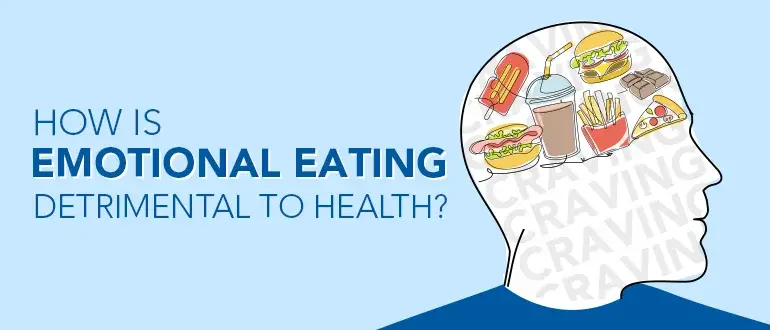Subscribe to get weekly insights
Always stay up to date with our newest articles sent direct to your inbox
Published on 8 Jan, 2025
favorite2Likes
82 Views
4 min Read

Do you crave for food when you feel overwhelmed?
Do you remember how, when you were feeling down, your mother would brighten your day with comfort food? Or when you achieved something significant, she would prepare your favorite sweet treat? On a gloomy rainy day, the irresistible aroma of pakodas and tea would drift from the kitchen, bringing warmth and joy.
In Indian households, food is more than nourishment—it’s an expression of love and care. Whether it’s a celebration or simply a way to lift someone’s spirits, tasty offerings are a time-honored way of showing affection.
However, did you know this familiar habit has unconsciously woven a deep connection between food and emotion? This bond often blurs the lines between hunger and emotional cravings, making it hard for us to distinguish between the two.
We at Care Health Insurance care about your well-being. Therefore, we bring this silent issue to your attention so that you can identify emotional eating and take healthy measures to prevent overeating when overwhelmed. Let us first determine what emotional eating is.
Emotional foods help you escape, change, numb, or amplify your feelings.
The roots of emotional eating go beyond the cultural context and can have physiological triggers too. When stressed, you might crave something sweet, salty, or fatty. This is your body reacting to the release of cortisol, a stress hormone in your bloodstream. Similarly, eating something sweet during a celebration amplifies the happiness hormone dopamine!
Technically, emotional eating is the habit of turning to food to cope with boredom, happiness, sadness, or loneliness and seek comfort, distractions, or indulgence. Unlike physical hunger, emotional eating refers to a sudden urge to have something unhealthy.
If not identified in the early stages, emotional eating may become a primary coping mechanism and potentially impact physical and emotional well-being over time. Let us now understand how emotional eating affects an individual.
A Science Direct Survey of 2333 participants revealed that nearly 64% of the participants displayed emotional eating as a coping mechanism to stress. Studies also suggest that turning to food to escape stress or other emotions may lead to high BMI and other chronic health issues in the long term. Here are a few ways in which unconscious eating may harm your health.
May Lead to Chronic Illness: Emotional cravings are sudden and generally encourage you to consume unhealthy food, without listening to your body’s cues. This, in turn, may lead to health issues such as high cholesterol, hypertension, obesity, etc.
Disrupts Hunger Cues: Emotional eating occurs when your mind starts demanding food without a signal from an empty stomach. If you begin taking hunger cues from your mind, your digestive system may not be ready for the intake of food. Repeated episodes of feeding without physical signals for food could lead to disruption in hunger cues from the body.
Leads to Blood Sugar Imbalance: Comfort foods, such as sugars and stimulants, deliver a momentary sense of wellbeing, which are typically followed by a mild sense of fatigue or mood swings due to imbalances in blood sugar levels. Over time, repeated imbalances can lead to severe diabetic conditions.
Impacts on Mental Health: Consuming food based on your mood does not just weaken you physically; it could make you vulnerable to mental health issues too. Frequent emotional eating may prevent you from actually addressing the underlying issue and lead to anxiety and depression.
Viscious Cycle of Guilt and Stress: Excessive emotional eating may lead to a sense of shame, which may increase your stress and motivate another episode of unconscious eating, to cope with the negative emotions.
____________________________________________________________________________
Now that you know what emotional eating is and how it could affect you, if left unchecked, let’s figure out how to discern between physical (and healthy) hunger and emotional cravings. Here are a few illustrations of what emotional eating looks, like compared to physical hunger.
| Emotional Eating | Physical Hunger |
|---|---|
| Sudden craving for food | Builds gradually |
| Felt in the mind | Felt in the stomach |
| Craving only certain food | Open to a range of foods |
| Persistent shame or guilt | Once satisfied, leaves you with a feeling of fullness |
| Not knowing when to stop | Sensible understanding of when to stop |
| May lead to fatigue and chronic health issues | Keeps you healthy |
Having a cheat day, once in a while, may not be harmful. However, if overeating becomes a coping mechanism, it can become detrimental to physical and emotional health. Therefore, you must first identify and analyse your eating habits and then take necessary measures to prevent emotional eating, in the event that it occurs. Some practices you may follow to avoid unconscious food consumption are mentioned below.
We hope this article helped you identify your eating patterns. Do share these insights with those you care about, to support healthier eating and better overall wellness.
Till next time...
Stay Healthy, Stay Happy!
Team Care Health
Always stay up to date with our newest articles sent direct to your inbox
Loading...